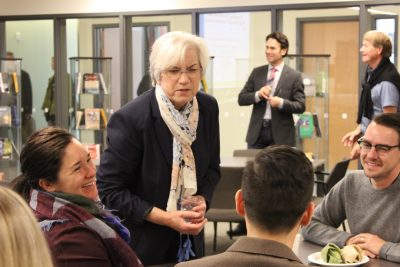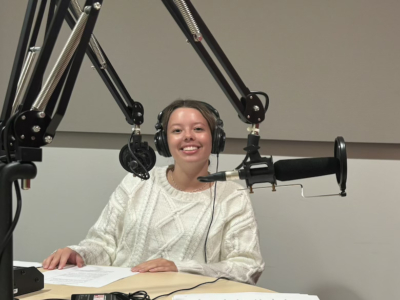The Communication and Media Studies program was proud to host international risk communication expert Dr. Marsha Vanderford as a ‘practitioner-in-residence’ from Oct. 30 – Nov. 1, 2017.
Dr. Vanderford helped lead communication teams at the World Health Organization through major international health emergencies, most recently Zika Virus and Yellow Fever in Angola and the DRC. Prior to her work with the WHO, she led international efforts for the U.S. Centers for Disease Control and Prevention during major environmental and public health emergencies, including the Gulf of Mexico Oil Spill and H1N1 influenza pandemic.
During her visit, Dr. Vanderford delivered a series of guest lectures to undergraduate and graduate classes in communication and media studies, in addition to hosting an engaging lunchtime talk at the Reader’s Digest Resource Centre.

Dr. Vanderford met with students and faculty for a lunchtime talk.
In her talk, Dr. Vanderford broke down the hectic eight-month period in which she and her team worked through political pressure and high levels of scientific uncertainty during the outbreak of Zika virus that mostly affected communities in northeast Brazil but sent shockwaves of worry, fear and anxiety throughout the region and around the world.
“While communicating uncertainty is an important characteristic of every health emergency, it was the defining characteristic of the Zika crisis,” said Dr Vanderford, emphasizing how important it is that communication professionals choose their words carefully and maintain the public’s trust when providing ongoing updates about an emerging health crisis.
Graduate students working on projects relating to health risk communication also had the opportunity to meet with Dr. Vanderford to discuss their work.
For third-year PhD candidate Gabriela Capurro, this kind of one-on-one encounter is incredibly valuable.
“Talking with Dr. Vanderford was an amazing opportunity,” said Capurro, whose research looks at how public health risks are rhetorically constructed and how these messages influence public perceptions of risk.
For her dissertation, Capurro will be studying the discursive construction of so-called ‘superbugs.’
“These visits are important for me as a graduate student, because I get to see how the different theories and models that inform my research are translated into actual communication campaigns that affect people’s lives,” she explained.
Friday, November 3, 2017 in Communication News, News, Research
Share: Twitter, Facebook



